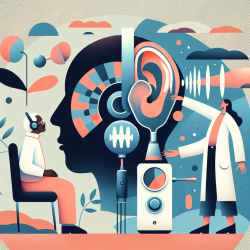Audiometric testing is a cornerstone in the diagnosis and management of hearing loss. However, variability in test-retest results, especially among different age groups, can pose challenges to clinicians. A study by Landry and Green offers valuable insights into the nature of this variability, providing a pathway for practitioners to refine their assessment techniques and improve the accuracy of hearing evaluations.
Understanding Test-Retest Variability
Pure-tone audiometry, a fundamental tool in audiological assessments, assumes that hearing thresholds can be reliably measured and that these measurements can be consistently reproduced. However, research has shown that various factors, including age, transducer type, and frequency of the tones used, can affect test-retest reliability. Landry and Green's study specifically explores these variables, focusing on the differences in test-retest variability among young adults, older adults, and the elderly.
The Study's Findings
The research highlights significant findings regarding the influence of age and transducer type on the variability of audiometric thresholds at different frequencies. Notably, it was found that:
- No significant test-retest differences were observed at lower frequencies (250, 500, and 1000 Hz) across all age groups.
- Significant variability was noted at higher frequencies (2000, 4000, and 8000 Hz), particularly among the elderly participants.
- Insert earphones showed a greater test-retest difference at 2000 Hz compared to supraaural earphones.
- The aging ear canal structure and the inherent variability in transducer coupling characteristics were speculated to contribute to the observed variability.
Implications for Clinical Practice
The study's outcomes underscore the need for audiologists to exercise caution when interpreting audiometric threshold test-retest changes in adult listeners, especially in the elderly. The findings suggest that audiometric assessments should consider the potential for increased variability at higher frequencies and the impact of transducer type on test results. Here are some ways practitioners can implement these insights:
Customizing Audiometric Assessments
Understanding the specific variability patterns associated with different age groups can guide audiologists in customizing their assessment approaches. For elderly patients, who show greater variability at higher frequencies, clinicians might need to place more emphasis on corroborating audiometric findings with other assessments or repeat tests to confirm results.
Choosing the Right Transducer
The choice of transducer can significantly affect the reliability of audiometric tests. Insert earphones, for instance, may introduce more variability at certain frequencies. Audiologists should weigh the pros and cons of using different transducers based on the patient's age and the specific frequencies being tested.
Further Research and Development
Landry and Green's study also highlights the need for ongoing research to better understand the mechanisms behind test-retest variability and to develop more reliable audiometric testing methods. Future studies could explore new transducer technologies or test protocols specifically designed to reduce variability among elderly patients.
Conclusion
The research on pure-tone audiometric threshold test-retest variability provides essential insights that can help audiologists improve the accuracy and reliability of hearing assessments. By considering the effects of age, transducer type, and test frequency, clinicians can better interpret test results and make more informed decisions in the diagnosis and management of hearing loss.
For practitioners looking to deepen their understanding and refine their skills in audiological assessments, integrating the outcomes of this research into their practice is a valuable step forward. Moreover, the study's findings underscore the importance of further research in this area, which could lead to significant advancements in audiological testing and hearing loss management.
To read the original research paper, please follow this link: Pure-Tone Audiometric Threshold Test-Retest Variability in Young and Elderly Adults.










